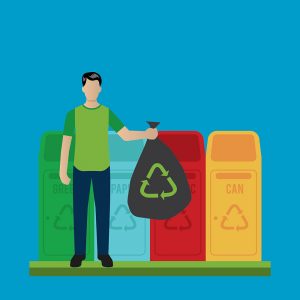

Gone are the days that recycling is just for soda cans and household plastics. More and more, just about anything can be recycled. When something is recycled, it’s being refurbished so that it can be re-used to make something new and shiny. Recycling isn’t just good for the environment, it’s good for a contractor’s wallet as well. By recycling the products that are no longer used it helps create other products that people want at an affordable price. So, what exactly can a contractor recycle? As a contractor, you’re surrounded by all kinds of stuff that can be recycled. Scrap metal, light bulbs, paint, hard hats, and even asphalt…

Appliances, cans, air conditioners, copper pipes, and other metals can all be recycled. By recycling metal we can reduce the amount of metal needed and save resources. Scrap metal can also be lucrative and help contractors recoup money and increase profits. For a product to be classified as scrap metal, at least 50% of it must be metal. It’s also important to know that there are two classes of metals: ferrous and nonferrous. Ferrous metals have iron in it. Any easy way to know if a metal is ferrous is to stick a magnet on it. If it sticks, it’s ferrous metal. Nonferrous metals are all other metals.
If a light bulb contains mercury, you must dispose of it properly. The best way to do that is by recycling it to keep it from harming the environment, animals, or people. The glass can also be re-used. Standard light bulbs can be thrown away. It is nearly impossible to reuse them.
Paints and solvents can be given to a leftover paint collection program. However, if that won’t work, you can donate or give away the paint to someone that can use it. If that still isn’t an option, you can pour the paint into sawdust or newspaper and leave it to dry. Once dried, you can throw it away. However, DO NOT ever do this with liquid alkyd or oil-based paints. Both contain volatile organic compounds that can cause dizziness, headaches, lung, and skin irritation., respiratory issues and liver or kidney disorders. To dissolve solvents, the best thing to do is contact your state or local government EPA center for advice.